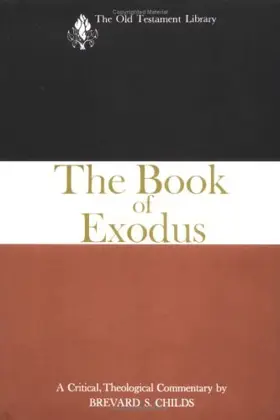

The Book of Exodus
Pages
659
Publisher
Westminster Press
Published
1974
ISBN-13
9780664209858
Collections
This book appears in the following featured collections.
- Recommended OT Commentaries by Denver Seminary Journal
- Ultimate Commentary Collection: OT Technical by John Glynn
- Favorite Advanced OT Commentaries by Jeremy Pierce (parableman)
- Best Advanced OT Commentaries by Jason Gile
- Essential OT Commentaries for a Preacher's Library by Derek W. H. Thomas
- Old Testament Advanced Commentaries by Moore Theological College Journal: Societas
Reviews
This was a landmark when it appeared. Childs demonstrates that he can play the critical game with the best of them, discussing sources and parallels and a huge number of scholarly conjectures. Then he insists (over and over) that the real job is to interpret the text as it stands. On top of that, he takes seriously the Jewish and Christian interpreters of the past and even attempts some theological commentary. All this was very new and dramatic when the commentary first appears. Today, however, I would prefer to take all that for granted and just focus on the text and its meaning. Childs was moving in the right direction, but he was still too prone to a kind of woodenly literal reading: the text says this here, something slightly different there, so there must be two sources. It’s like he had never read a literary text. The commentary is important, but one should now turn to more recent work.
. A standard critical and theological commentary on Exodus remains Brevard
Childs, The Book of Exodus, Old Testament Library.Childs
includes a full range of discussions on historical-critical matters, larger Old Testament context,
New Testament context, and history of exegesis. It has weathered well over 30 years.
. A standard critical and theological commentary on Exodus remains Brevard
Childs, The Book of Exodus, Old Testament Library
There is near-unanimous praise for this volume by Brevard Childs even though it comes from the critical stream. Jim Rosscup of The Master’s Seminary recommends it with a caveat, saying it is “suitable for scholars or intense, advanced students who have discernment to weigh what is good and what is subjective theory pressed in.” This seems like a must-have commentary for the preacher, but he will want to have others available besides. It is probably not as useful or appropriate for the casual reader.
Adopts a critical stance.
When I first studied Exodus 18 years ago, I went through many commentaries that left me totally unsatisfied. Even Childs' commentary, which at that time was the top of everyone's list, left me dry. Though I could see why it was an especially important commentary in its day in terms of interpretation issues, it rarely gave me new insights or got me excited about the text. Very technical. Today there are much better commentaries. This commentary might be beneficial for the very serious theology student, but those just looking to understand and love the book of Exodus, see Fretheim, Janzen and Sarna.
Because of the author's critical stance and the book's technical nature, I can only recommend this commentary to discerning pastors and teachers. Childs begins each section of the commentary with his own translation of the Hebrew. He then offers textual and philological notes on that section. The discussion titled "Old Testament context" contains his exegesis of the text itself. The remaining three segments are what really set Childs' commentary apart. For each section of text, he discusses the New Testament use of the Old Testament text, the history of its interpretation, and any related theological issues.
[Full Review]
The application of the canonical approach to a higher critical commentary. Includes a history of interpretation for each passage.
[Full Review]








